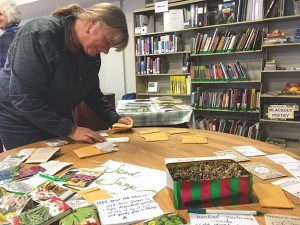
Every plant has a story, seedy though it may be.
Members of the Jasper Local Food Society gathered at the municipal library to learn about the ins and outs of creating a local seed library, April 15.
Not to be confused with a seed bank, which is designed to stockpile seeds in case of prolonged war or severe drought, a seed library is “alive” allowing gardeners to borrow seeds, plant them and harvest the spoils before returning a fresh set of seeds at the end of the plant’s cycle.
For many plants that’s just one season a year, but the turnaround can stretch to two years in the case of root vegetables like carrots, or even longer for garlic, which itself is the seed.
The idea drew about 30 people to Seedy Saturday, a pretty good turnout for Easter weekend, according to organizers Fern Yip and Paula Klassen.
They said they have already secured a spot with the library for a space for the seeds and envision it taking the form of a repurposed dewey decimal cabinet system stocked with different varieties of plants.
A screening of Seed: The Untold Story attracted another 25 people two days earlier most of them different than the folks who attended Saturday’s event.
Yip and Klassen said Saturday’s event was the first of a series of workshops related to cultivating a Jasper seed exchange.
The benefits and connections to local food security are many and perhaps clearest when contrasting them with the perceived drawbacks of buying seeds from a multi-national corporation.
Local seeds create local plants which are accustomed to the region’s climate and therefore more likely to succeed. The seeds those plants in turn generate are more likely to yield successful plants themselves as opposed to store-bought seeds, which are often hybrids and cannot grow into a “true” version of the fruit or vegetable the gardener has in mind.
“This is about seed security,” Yip said. “We’re trying to build capacity.”
To get things going a batch of seeds from Barrhead, which is similar to Jasper’s climate, is in the mail. The heritage, organic, open-pollinated seeds will be sent out to every person who attended Seedy Saturday and are available to everyone else, too. Just email [email protected].
Craig Gilbert
[email protected]
